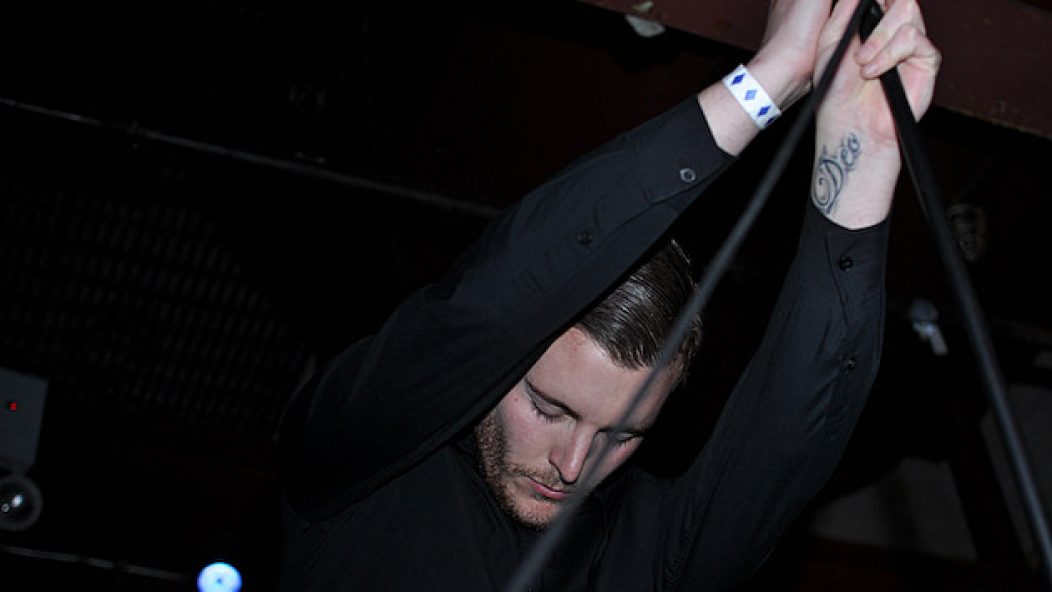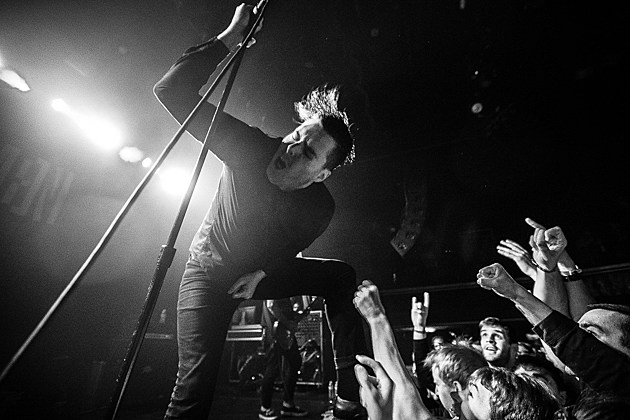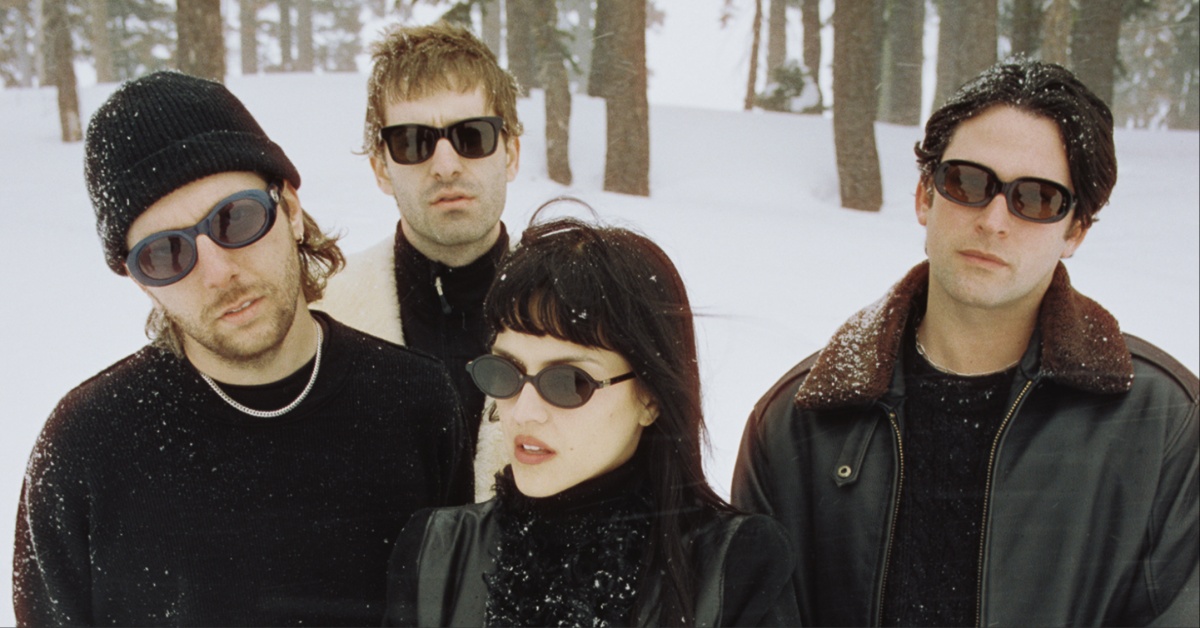
Now I'm a Believer: Seeing Ghost and Deafheaven Back to Back

…
Chances are you’ve seen people bicker and fight this year over three bands: Ghost, Deafheaven and Liturgy. This unholy trinity mirrors the Holy Trinity as put forward by the Catholic Church–The Father (Liturgy), The Son (Deafheaven) and the Holy Spirit (Ghost). I saw Ghost and Deafheaven on back-to-back nights in Seattle on October 20 and 21 and now, to varying degrees, I am a believer.
These three groups have more in common than the ire they arouse in some people and their mutual interest in black metal. All three released promising debuts around the turn of the decade. Ghost’s first album Opus Eponymous is still uncontroversially good. All three later released polished and fairly evolved sophomore records that were met with disdain for reasons unrelated to the music: Liturgy preceded Aesthetica’s release with a manifesto that (perhaps unintentionally) threw shade on most of the band’s potential listeners. Ghost signed a major label contract, recorded Infestissumam in Nashville and released it with, among other things, a dildo and butt plug set. Maybe worst, Deafheaven released Sunbather with a pink piece of cover art which later landed on an iPhone commercial (unlike Feist, their music was not included in the commercial).
Liturgy’s newest work hasn’t really ignited my imagination, but Ghost and Deafheaven both hit their respective strides in 2015. Ghost’s new album, Meliora displays better hooks and more focus than its predecessor. Deafheaven’s latest, New Bermuda, displays more chugging riffs and in general sounds more aggressive than the band’s past albums.
The line for Ghost’s October 20 show at El Corazon wrapped all the way around the venue. The show had been sold out for months; I scalped tickets at my significant other’s behest. She’s not a metalhead, but like many people (including plants in Stephen Colbert’s studio audience) Ghost has completely captured her imagination.
The doors opened late (we found out later that Ghost themselves did not arrive until after the show began), leaving us to get intimate with Ghost’s fans, who dress in a complete fashion spectrum: some in patch vests and some in casual wear, some still in their suits and jackets from the workday and some lavishly costumed in black faux-animal fabric and feathers.
Everyone seemed genuinely excited to be there which I realized I don’t often see at metal shows in Seattle. When great bands play nearby in small venues on a weekly basis, the act of going to a concert becomes in the short term a social pastime and in the long term a matter of due course. Ghost’s fanbase wanted not to be drunk with friends in proximity to loud music, but to to actually witness the band playing, even though the band tours frequently.
Ghost can stoke enthusiasm for their music in people in a way many metal bands cannot. Even relatively successful metal bands don’t inspire the kind of evangelism I saw. Metallica and KISS once did, but not during my lifetime. Lady Gaga is a closer analogue. She shares a distinct vocabulary with her fans, who imitate her in costume when seeing her live. Ghost and their fans do the same.
Inside the venue was oversold and uncomfortable in the extreme. People overheated and jockeyed for position with elbows and nasty words. I’ll never come to a sold out show at the venue again. Purson played in a side room to seemingly nobody.
We stood near the sound booth. Two older men in patch jackets gave us some shelter from the increasingly irate crowd while Ghost took a long time to set up. Their entrance music, Gregorian chants, looped and looped into pointlessness. We talked about the Black Metal Warfare tour which they attended, told my significant other the Euronymous/Varg story, and agreed that Watain were the best band on that bill. They had only good things to say about Ghost.
I don’t think any metal band on the planet has a better shot at lasting international fame and monetary success than Ghost right now. There are two reasons for this. First, their songs, especially on the new record, are remarkably likable, in spite of a weak vocalist and a sonic palate that is well behind the modern rock times. They only played two songs from their first album, near the beginning of their set, and focused on their newest material, possibly to downplay the irritating Blue Oyster Cult comparison that has dogged them since day one. BOC is too obscure of a reference point for a band like Ghost that is swinging for the fences. The Meliora material draws from Boston, Journey, and other hit machines. That material is balanced out by the often odd and too-rhythmic material from Infestissumam. That album also produced their best song live and on record, though: “Year Zero” had the too-packed crowd bouncing like a coffee table in an earthquake. It’s a glorified disco tune—their “I Was Made For Loving You,” and I’m glad they got their awkward trying-too-hard KISS phase out of the way on the second record. Now they’re writing Creatures of the Night
Second, Ghost is a band of performers and entertainers as well as musicians. People hate this about them, maybe more than the retrospective style for their music. Ghost’s naked entertainment value flies in the face of concepts like independence, artistic authenticity and the singer-songwriter ethos. Meanwhile, the anonymity of the performers themselves makes the band into a brand as much as a musical venture, and that comes with the discomfort of corporate distrust.
What’s worse, there’s no rough-hewn basement cuteness to them any longer. They’re now officially good at being a brand. The band’s iconography makes for great merchandise and easily-shared images the way Iron Maiden’s did Papa Emeritus in particular is as flexible a character design as Eddy was in 1985. Previously this posed a problem, as the actual singer, Tobias “Papa Emeritus” Forge, was neither a dynamic band leader nor a particularly good singer. that’s not true anymore.
Partway through the set, Forge changed into a second Papa Emeritus costume, with a smart coat-and-tails jacket instead of papal robes. It’s a more comfortable look, one that came with notably better singing, as well as increased mobility. Papa 3.0 is better at the business of being an entertainer: making jokes, interacting with the crowd and gesticulating during the song.
Ghost’s critics forget that musicians who do not wear costumes are play acting as well. Rock has always had uniforms, see: Band of Gypsys, The Ramones. Even Metallica’s classic black-jeans-black-shirt-white-sneakers-no-logos look was a synchronized outfit. These are costumes and branding as well, and the earnestness of the underground hardcore frontman is a role that we learn and recite to one another—so is the perpetually dissatisfied black metal curmudgeon, for that matter. To their detriment, these roles (or the people playing them) seldom become large enough for most audiences to take part in.
George Clarke understands this. The Deafheaven frontman remains the best thing about his band’s life performance, judging by their performance on Octobber 21 at Neumos. The role he’s made for himself may wear a slightly fashionable costume (are people really flipping out over a black collared shirt and jeans that fit?), but it’s an amalgamation of hardcore punk motivator and black metal introvert. But what he does with those roles is emote. He displays so many signifiers of feeling, in fact, that it veers into melodrama. This is what his fans love about him—they literally fight to touch his hand—and what his vociferous detractors despise. His take on black metal is not only obviously performative, but by contrast illuminates the grimness of his predecessors as a put-on as well.
The rest of Deafheaven is pretty good too. Kerry McCoy knows his way around a melody, and his bandmates have brought out the savagery that his old work was so lacking. Their old stuff felt like the result of an incomplete digestion of their influences. Sunbather sounds as if the band consciously decided to make “a black metal and shoegaze album” but spent so much time honing the style that they forgot the songcraft. Now they’ve learned the value of a guitar solo and a good mosh pit. If Ghost is trying to smuggle black metal blasphemy into classic rock, then Deafheaven is trying to smuggle metal’s violent expressionism into alternative rock.
In contrast to Rhys’s review, I think New Bermuda is the band’s best piece by far, and judging by the set list they agree: they played the whole album along with “From the Kettle Onto the Coil.” The songs work so well in a live context that I felt embarassed about the copious arguments over them before. Their performance convinced me to give the record itself a few more tries and that’s the most a non-fan can reasonably ask of a band.
The slavish devotion of their fans still seems a bit unfounded—people love Deafheaven the way a person stranded in a desert for days loves the first person who gives them a drink of water. That water might be Evian, or it might cause Cyclosporiasis, either way it’s needed and replenishing in the short term. The trouble is that nobody seems to be questioning the quality of that water.
Black metal is emotive music, and in the age of personal politics and widespread individual expression, that emotion need to be heightened. In America, that emotion also needs to pertain to the lives of the people listening to it, which Scandinavian heritage and Satanism by and large do not. I don’t like Clarke’s lyrics. His observations on the mundane fail to bring any deeper truth to the ennui of his life; it reads like personal journal entries repurposed for an MFA application. At least, though, they’re reflective of the lives of the people that consume them.
Clarke’s physical motions are more representative of his emotional states than his lyrics or delivery are. He begs the audience to get closer and poses, which is performative and hokey in a way that Forge is not. Unlike Forge, through, Clarke will grab your hand and sing right to you. That’s the kind of powerful role playing that makes consumers into lifelong fans.
Most telling, maybe, are his little movements. The shimmies and hip gyrations that pepper his moments between verses. They are derived from hip-hop, which makes sense considering that Clarke, like me, likely grew up watching rap and R&B on MTV.
They’re also sexual without a distinct masculinity. The most obvious predecessor for him, then, is David Bowie, who brought a sexualized androgyny to rock music. Bowie’s shadow looms over Forge as well. The Papa Emeritus character, freed of its robes, is a bit of a dandy, and is eager to remind the audience that many of Ghost’s songs are about sex. That sex may or may not be vanilla or heteronormative. Theatrics are a part of both of these bands, and homophobia presses back against theater in all of its forms, maybe even more so when theater finds inroads in metal.
People allow people to walk onto elevated stages and pretend to be something—even a true thing— in order to have someone to throw objects at. These don’t need to be literal objects, but they do need to loosely be one of two things: roses, or pieces of garbage. If I’ve learned one thing it’s that people who hate theater do not throw garbage, they simply don’t go to the show. The people who throw garbage usually just think they could do it better, but simultaneously don’t have a clue as to how to begin to do so. Mostly, they just wish someone would put them on a platform and throw roses at them.
Personally, I just bought the t-shirts. I’m not ashamed to wear them either.
…
This article has been edited to properly reflect the name Kerry McCoy
…











